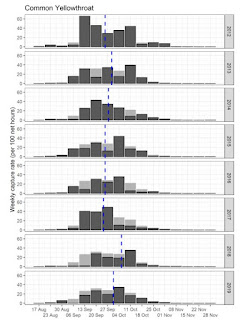Captain Sam's:
Today was almost similar to yesterday. With a total of 51 birds, only 4 of those birds were recaptures. A unique catch of the day was Captain Sam's getting an Eastern Kingbird during our first net run. It was really fun to finally catch one! Common Yellowthroats were our highest catch with a total of 35 out of the 47 newly banded birds. It's the start of our first waves of Common Yellowthroats, but over the years it's a slow decrease of the total number of Common Yellowthroats we catch. Check out this chart below here to see how each year differs from 2012 to 2019. The 2-month long catch of Common Yellowthroats are still the same each year but the numbers have been decreasing.
Thanks for checking out this blog and until next time,
Kristin
Little Bear:
 |
| Sunrise at Little Bear. Photo by Ben Stalheim |
 |
| Hatch-year Eastern Screech-Owl. Photo by Josh Lefever |
The other bird we hadn't yet caught this year? A Yellow-breasted Chat! Things had started to slow down, when miraculously, Josh brought back a good haul of birds. Including, the amazing and brightly colored Chat. Yellow-breasted Chats can do eccentric molts as hatch-year birds, which is a good way to quickly determine the age. In our bird, it was subtle, but the Chat had replaced its outer primaries (P4-9), but not P1-3. In a definitive molt cycle, the bird would start at P1 and replace all its flight feathers symmetrically. However, with the eccentric molt, it skips some of its inner primaries and outer secondaries and chooses to replace blocks of feathers in a seemingly "out of order" way, despite that there is nothing out of order about it. This Chat had also replaced its inner secondaries (S6-9) and not S1-5, again creating a block of new formative feathers contrasting with its retained juvenile ones.
Kristin explains it much better above and has excellent photos to display this pattern, but it is a fascinating strategy and one that helps us to age birds in the hand.
Although we did catch only 7 Common Yellowthroats, we were lucky to start seeing some unique-looking hatch-year males growing in their characteristic black masks.
 |
| Hatch-year Male Common Yellowthroat. Photo by Ben Stalheim |
-Ben
| Species | Captain Sam's | Little Bear | ||
|---|---|---|---|---|
| New | Recaps | New | Recaps | |
Eastern Screech Owl | - | - | 1 | - |
Downy Woodpecker | - | 1 | - | - |
Eastern Kingbird | 1 | - | - | - |
Red-eyed Vireo | 2 | - | - | - |
Carolina Wren | - | 1 | - | - |
Yellow-breasted Chat | - | - | 1 | - |
Ovenbird | 1 | - | - | - |
Northern Waterthrush | 2 | - | 3 | - |
Black-and-white Warbler | 1 | - | - | - |
Common Yellowthroat | 34 | - | 7 | - |
American Redstart | 2 | - | 1 | - |
Yellow Warbler | 1 | - | 3 | - |
Northern Cardinal | 1 | - | - | 1 |
Painted Bunting | 1 | 2 | 2 | 1 |
| Today's Banding Stats | Captain Sam's | Little Bear | TOTAL |
|---|---|---|---|
| # Birds Banded | 47 | 18 | 55 |
| # of Recaptures | 4 | 2 | 6 |
| # of Species | 10 | 8 | 12 |
| Effort (net-hours) | 175.5 | 109.5 | 285 |
| Capture Rate (birds/100 net-hours) | 29.1 | 18.3 | 21.4 |
| # of Nets | 30 | 23 | - |
| 2021 Fall Cumulative Banding Stats | Captain Sam's | Little Bear | TOTAL |
|---|---|---|---|
| # Birds Banded | 413 | 248 | 661 |
| # of Recaptures | 116 | 42 | 158 |
| # of Species | 37 | 30 | 44 |
| Effort (net-hours) | 2,710.5 | 1,478.4 | 4,188.9 |
| Capture Rate (birds/100 net-hours) | 19.5 | 19.6 | 19.55 |
| # of Days | 20 | 15 | - |
Banding Staff



